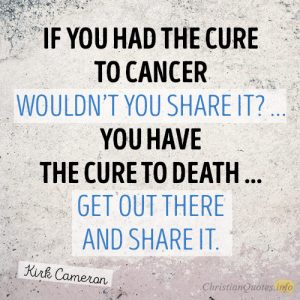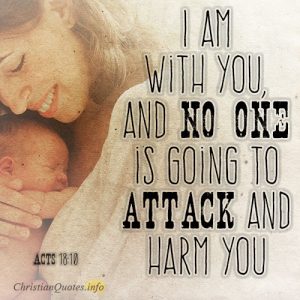– Acts 1:8
Continue reading
Tag: Evangelism
5 Reasons We Must Share Our Faith
– Kirk Cameron
Continue reading
3 Ways Believers Shake Up The World
– Catherine Booth
Continue reading
3 Duties of a Christian
– Harry Emerson Fosdick
Continue reading
3 Reasons Not To Fear While Witnessing
– Acts 18:10
3 Joys of Soul Winning
3 Joys of the Soul Winner
– Charles Spurgeon
Continue reading
4 Approaches to Sin’s Cure
– Kirk Cameron
Continue reading
4 Ways God Is Always With Us
– Matthew 28:20
Continue reading
4 Ways You Can Know The Joy Of Soul Winning
– Charles Spurgeon
Continue reading
What’s It Like To Walk Out Of Prison?
What’s it like to walk out of prison and reenter the world?
Institutionalized
If you’ve ever seen the movie, The Shawshank Redemption, you might remember Brooks Hatlen. He was terrified at the thought of being released, and he’s not exception. It had been a lifetime since Brooks had lived as a free man, but after decades of incarceration, time had changed everything…including the people. It was a world he clearly didn’t fit it in with, and tragically, in the movie, he ended his own life. Even though this is a fictional account, this really is repeated over and over again, and all over the world. For most of these men and women, being incarcerated for decades, is like being Rip Van Winkle. They wake up to a world that has changed so much that it’s too overwhelming. Many want to go back, and a substantial number do, but there is a Helper, and those in the Body of Christ that have often stepped in can help, but not everyone has access to such resources.
Survivor
Most states do not have half-way houses or transitional housing for every inmate that’s released. In one prison, a man is given a little a $500-value card, but the card has to be activated over the Internet or by use of a phone, and few have access to either after their release. When a person’s released from prison, and they have no one on the outside to pick them up (occurs with frequency), they’re usually escorted to the end of the prison property, and then watched until they disappear from sight. Maybe they wish them good luck, I don’t know, but beyond that, they’re pretty much on their own. And they’re at risk for becoming homeless? Finding someone to rent to someone on parole is hard enough, but try coming up with the money for them to pay a deposit on the house/apartment, plus the other deposits for the other utilities? The state requires them to have a permanent address so that their parole officer can keep track of them, but if their county has no homeless shelter, where are they supposed to go? What address can they use? It’s like an episode of survivor, gone bad. The parole officers expect them to have a permanent address, but some homeless shelters require a state issued ID before they can admit them. The problem is, the state won’t issue them a state ID without their having an address or place of residence. It’s a classic setup for failure, but how so many prisoners still manage to negotiate through this dangerous maze is beyond me. It’s to their credit that so many do survive and pick up their life again, but even here, it will never be the same. There is no “normal” anymore…only, different…everything’s different.
Shopping
Recently, I took a man shopping who had just been released from prison. To me, it’s an easy task for me to find what I need, but for someone who’s been in prison for years, just a simple experience like shopping becomes a mass of confusion. The aisles, products, displays, arrangements, and locations of things are not the way they remember, if they remember at all. Everything’s changed. The name brands have changed, the packaging, the prices, and now there are so many choices…but there is so little money (just over $500 dollars). And the little money they do have, goes quickly. For them, money talks, but it mostly says, “Bye, bye.” It is times like this when they remember Jesus’ words, “Look at the birds of the air: they neither sow nor reap nor gather into barns, and yet your heavenly Father feeds them. Are you not of more value than they” (Matt 6:26)? Undoubtedly, many do believe they’re more valuable than many sparrows, but the world doesn’t think so. At least most don’t, but those who have taken up Christ’s command have reached out and given a present help in time of need. The number of faith-based shelters for released inmates easily outstrips those of the private sector, and they don’t require that you believe in Christ to receive shelter…they do expect them to abide by the rules, but even these rules are in their best interests, so for some, there is hope. As Andy Dufresne (on The Shawshank Redemption) said, “Hope is a good thing, maybe the best of things, and no good thing ever dies.” The hope these men and women have is in Christ is a good thing. They know that even if they die, they will live in again (John 11:25-26), but this time, it’ll be in the presence of God. They will see His face for the very first time (Rev 21:3; 22:4). That hope helps many of these men and women endure what we ourselves probably couldn’t!
Double Jeopardy
Another issue that those released from prison face is that they’re still called felons, or at least treated that way, but that’s not true. They’re felons no longer! They were tried, convicted, sentenced, and have served their time. The state says they are free to rejoin society, but society doesn’t always want to let them. Many experience a double-jeopardy. They’ve served their time and paid the fine, but still considered guilty. You don’t have to imagine someone getting a ticket for parking too close to a fire hydrant. It happens all the time, but if someone pays their fine for parking by a fire hydrant, their friends don’t call, “Fire bug!” the rest of their lives. That fine’s been paid in full. So too have these men and women had their sins paid in full (2 Cor 5:21), as well as their crimes. They are no longer guilty before God or mankind. They stand as having Jesus’ own righteousness. Many of these men I’ve spoken with have told me that years of regret have left an indelible mark upon their hearts; for years and years they’ve relived the moment, over and over again; always dreaming about stopping themselves before it’s too late. Their prison life may have years of, “What if I had done that” or “What would have happened if…” Heartbreaking as it is, their brokenness has made them receptive to God’s Spirit and Word. Their hearts, tilled by the hard years of prison, having made them fallow ground for the Seed of His Word to penetrate. And if the Word of God, shared by a person of God, is moved by the Spirit of God, then they may become the children of God. And of course, this is all for the glory of God (Psalm 115:1; 1 Cor 4:7).
Conclusion
God’s tender words to speak to them: “As a father shows compassion to his children, so the LORD shows compassion to those who fear him” (Psalm103:13). I would ask you to pray with compassion for these men and women who are presently in prison and are believers; for those in prison who have not yet trusted in Christ; and for those who are going to or have been released. They face an uncertain world, and many are immediately placed between a rock and a hard place, and with few solutions, but even so, many have said to me, “Blessed be the God and Father of our Lord Jesus Christ! According to his great mercy, he has caused us to be born again to a living hope through the resurrection of Jesus Christ from the dead” (1 Pet 1:3)? Their families might have forsaken them; their friends might have turned their backs on them; and the world look at them as if they’re still guilty, but these men and women are made in the image of God no less than we are (Gen 1:26). They have paid what they owed, so since God “comforts us in all our affliction, so that we may be able to comfort those who are in any affliction, with the comfort with which we ourselves are comforted by God” (2 Cor 1:3-4), let Him use us as a means to comfort others by visiting others (Matt 25:36), just as if we had done it to Jesus (Matt 25:40).
Kirk Cameron Quote – 5 Ways You’re Evangelizing Without Even Knowing It
– Kirk Cameron
Continue reading
Catherine Booth Quote – 5 Small Ways You Can Create a Better Future for Yourself
– Catherine Booth
Continue reading
Charles Spurgeon Quote – Missionary or Imposter
“Every Christian is either a missionary or an impostor.”
– Charles Spurgeon
Rick Warren Quote – Treasures in Heaven
“The way you store up treasure in heaven is by investing in getting people there.”
Rick Warren
Get the Daily Quote in FB Messenger
Just click the button below and follow the instruction we send you.
 Written by Pastor Jack Wellman
Written by Pastor Jack Wellman















